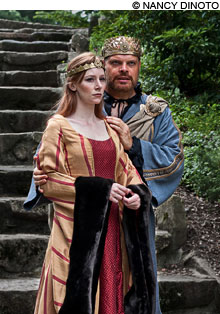
ROYAL COUPLE Trask and Corkins in Macbeth. |
The dolorous Dane provides endless fascination and those star-crossed lovers will never run out of fans, but for sheer density of dramatic emotional conflict nothing beats Macbeth, as the Colonial Theatre is demonstrating in Westerly's Wilcox Park through July 29. Director Harland Meltzer helms the annual event, which this year enters its third decade. The production is polished, as the cast of 20 is bolstered with the skills of eight Actors Equity professionals in key roles.This may be the shortest of Shakespeare's tragedies, but the Bard didn't stint on mayhem. Pressured by his wife, military stalwart Macbeth murders the king and seats himself on the throne of Scotland. His guilt turns into unwarranted suspicion, so other murders or attempts at such follow, as does his inevitable demise. The play is a cautionary tale about the wages of ambition, the corruption of power, and the overcompensation of masculine pride. (I don't think it's just my bawdy imagination that made me laugh at Lady Macbeth's belt extending down between her legs. Shakespeare was not above dick jokes. Kudos to costume designers Joy Thibodeau and Christina Shea.)
The playwright was clever to not rely solely on Macbeth's innate condition or his wife's prodding to trigger such a horrific act as regicide. Things begin with Macbeth (Mark Corkins) and friend Banquo (Enrique Bravo) coming across a trio of witches chanting over a potion they are preparing ("Double, double toil and trouble; fire burn and cauldron bubble"). Among other things, they predict that Macbeth will become king. When their addressing him as thane of Glamis and Cawdor soon proves accurate, they gain credibility. Most cleverly, Shakespeare gives Macbeth a quasi-rational sense being untouchable, as the witches tell him he will never be vanquished until Birnam Woods come to Dunsinane hill and that "none of woman born shall harm Macbeth." How he is tricked provides amusing satisfaction.
Though the expression "milk of human kindness" originated here, it was only by negative example, as the passionately cruel lady Macbeth berates her husband for having too much of it. Corkins is coupled with Emily Trask, and they make for deliciously dastardly villains. As a tragic figure, Macbeth is as unsure of himself before and shortly after his murderous act, although once in power he plunges forth as heedless as a hurricane. Corkins provides the proper regal bearing and an underlying vulnerability; when the time comes for his "Tomorrow, and tomorrow, and tomorrow" soliloquy of despair, Macbeth has gained our empathy if not earned our sympathy.
As the usurping king's wheedling and even more ambitious wife, Trask is a formidable presence. Lady Macbeth has a single-track mind on which she speeds her husband to the throne, so she can be performed with uninteresting directness, but not here. The actress makes her shrewd and cunning, sexuality both masking her savage intentions and providing Macbeth further motivation. When this intense Lady Macbeth tells her husband, who is vacillating about murdering the king, that she would sooner bash out the brains of her suckling babe than not carry through such a serious promise, we believe her.